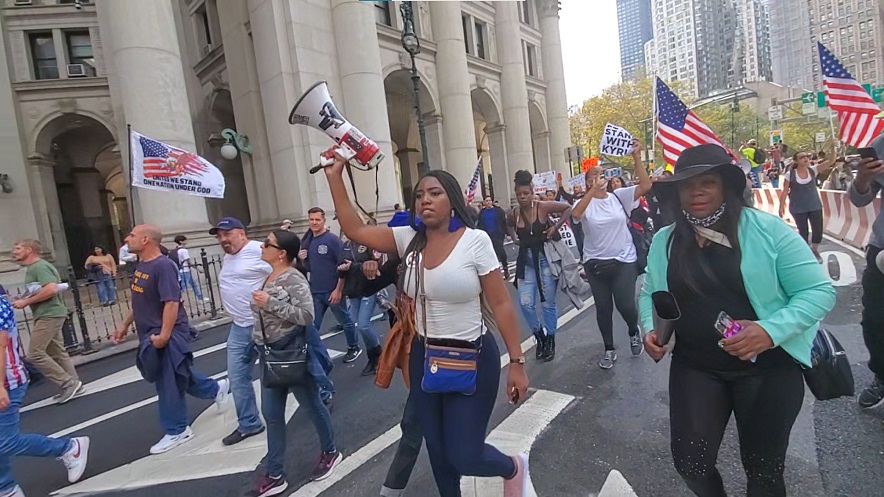Washington, D.C. – The U.S. Supreme Court on Thursday, January 13th, blocked an emergency federal rule requiring large private employers nationwide, as well as school districts and other public employers in more than half the states, to implement either a COVID-19 vaccine mandate or testing and masking rules.
“The regulation … operates as a blunt instrument,” a 6-3 court said in its unsigned majority opinion in National Federation of Independent Business v. Department of Labor (No. 21A244). “It draws no distinctions based on industry or risk of exposure to COVID–19.”
The emergency rule by the federal Occupational Safety and Health Administration, which was to begin taking effect this week, would have applied to public employers in the 26 states and two territories that have state-level workplace safety plans approved by the federal agency.
Meanwhile, in a separate decision, the court ruled 5-4 to allow a Department of Health and Human Services emergency rule requiring vaccines for workers at public and private health-care facilities that participate in Medicare and Medicaid. That case, Biden v. Missouri (No. 21A240), has implications for a separate HHS rule requiring vaccines for teachers and other workers in the federal Head Start early-education program.

Majority says COVID-19 is not purely a workplace danger
The OSHA rule was challenged in multiple lawsuits by business groups and 27 states, as well as by a handful of Catholic and Christian schools. The Supreme Court took up the question of issuing a stay on its emergency docket, and heard arguments on Jan. 7. The opinion makes clear that the majority believes the challengers will ultimately prevail on their arguments that OSHA exceeded its authority with the emergency vaccine rule for workplaces.
“We cannot agree” that “the risk of contracting COVID–19 qualifies as [a work-related] danger,” said the opinion. “Although COVID–19 is a risk that occurs in many workplaces, it is not an occupational hazard in most. COVID–19 can and does spread at home, in schools, during sporting events, and everywhere else that people gather.”
“Permitting OSHA to regulate the hazards of daily life—simply because most Americans have jobs and face those same risks while on the clock—would significantly expand OSHA’s regulatory authority without clear congressional authorization,” the opinion said.
AdChief Justice John G. Roberts Jr. and Justices Clarence Thomas, Samuel A. Alito Jr., Neil M. Gorsuch, Brett M. Kavanaugh, and Amy Coney Barrett made up the majority. Gorsuch, in a concurrence signed by Thomas and Alito, said it was a matter of who decides who may mandate vaccines and testing for as many as 84 million people, OSHA or Congress and state and local governments.
“[I]f this court were to abide them only in more tranquil conditions, declarations of emergencies would never end and the liberties our Constitution’s separation of powers seeks to preserve would amount to little,” Gorsuch said.
Justices Stephen G. Breyer, Sonia Sotomayor, and Elena Kagan jointly signed the dissent saying that COVID-19 is “a menace in work settings. The proof is all around us: Since the disease’s onset, most Americans have seen their workplaces transformed.”
“COVID–19 spreads more widely in workplaces than in other venues because more people spend more time together there,” the joint dissent said. “And critically, employees usually have little or no control in those settings.”
Why the decision involving health facilities may effect an HHS rule for Head Start teachers
The decision in the case involving the HHS vaccine rule for health facilities does not discuss the agency’s separate rule for Head Start teachers, but the logic of the opinion may be relevant.
The unsigned opinion notes that HHS found that 35 percent of staff members at Medicare and Medicaid-funded health-care facilities were unvaccinated, and thus “pose a serious threat to the health and safety of patients.”
The opinion noted that Congress has authorized the HHS secretary to impose conditions on the receipt of Medicaid and Medicare funds that, quoting the statute, “the secretary finds necessary in the interest of the health and safety of individuals who are furnished services.”
The vaccine requirement “thus fits neatly within the language of the statute,” the opinion said. “After all, ensuring that providers take steps to avoid transmitting a dangerous virus to their patients is consistent with the fundamental principle of the medical profession: first, do no harm.”
And “vaccination requirements are a common feature of the provision of health care in America,” the opinion added.
Roberts, Breyer, Sotomayor, Kagan, and Kavanaugh made up the majority in the HHS decision.
Thomas wrote a dissent joined by Alito, Gorsuch, and Barrett.
“The government has not made a strong showing that this hodgepodge of [statutory] provisions authorizes a nationwide vaccine mandate” for the federally funded health-care facilities, Thomas wrote.
Ad“Vaccine mandates also fall squarely within a state’s police power, and, until now, only rarely have been a tool of the federal government,” he said, citing a 1922 Supreme Court decision, Zucht v. King, which upheld a San Antonio, Texas, ordinance that required public and private schools to enforce a smallpox vaccination requirement for students and employees.
“If Congress had wanted to grant [the Centers for Medicare and Medicaid Services] authority to impose a nationwide vaccine mandate, and consequently alter the state-federal balance, it would have said so clearly. It did not,” Thomas said.
A federal judge in Louisiana on Jan. 1 issued a preliminary injunction against a separate HHS emergency rule requiring vaccines for Head Start teachers and others in contact with children. The ruling in the health-care case would appear to give the Biden administration some ammunition for any appeal seeking to revive that rule.




